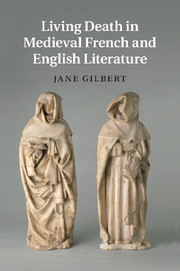Book contents
- Frontmatter
- Contents
- Acknowledgements
- Note on translations
- Introduction: living death
- 1 Roland and the second death
- 2 The knight as Thing: courtly love in the non-cyclic prose Lancelot
- 3 The ubi sunt topos in Middle French: sad stories of the death of kings
- 4 Ceci n'est pas une marguerite: anamorphosis in Pearl
- 5 Becoming woman in Chaucer: on ne naît pas femme, on le devient en mourant
- Conclusion: living dead or dead-in-life?
- Notes
- Bibliography
- Index
- Cambridge Studies in Medieval Literature
2 - The knight as Thing: courtly love in the non-cyclic prose Lancelot
Published online by Cambridge University Press: 01 March 2011
- Frontmatter
- Contents
- Acknowledgements
- Note on translations
- Introduction: living death
- 1 Roland and the second death
- 2 The knight as Thing: courtly love in the non-cyclic prose Lancelot
- 3 The ubi sunt topos in Middle French: sad stories of the death of kings
- 4 Ceci n'est pas une marguerite: anamorphosis in Pearl
- 5 Becoming woman in Chaucer: on ne naît pas femme, on le devient en mourant
- Conclusion: living dead or dead-in-life?
- Notes
- Bibliography
- Index
- Cambridge Studies in Medieval Literature
Summary
I closed Chapter 1 with the claim that the Oxford Chanson de Roland ends by interpreting Roland's death as a loving sacrifice for Charlemagne's sake; and that this was a misreading of the protagonist's desire. In this second chapter I turn to an unquestionable instance of a male character dying for love of another, whose own love in turn brings him close to death. These are, respectively, Galehot and Lancelot. Again I shall foreground a Lacanian analysis while exploring other ways of conceiving the ethical relation between love and death, that classic pairing. In human meditation, death provides a kind of yardstick to measure love, the affirmation ‘I would die for my beloved’ defining a horizon which is a constitutive element of love itself. Love often leads narratively to death, which is sometimes seen as successful consummation. It may persist beyond death. To love another person is to experience a kind of death of the self, which may then be reborn in a new guise as a lover. Love is therefore commonly associated with the entre-deux-morts. Parental love and the love of God will be considered in later chapters. The present chapter focuses on the tragic passion of noble lovers, the intensity of whose loves threatens calamity both for the lover, whose life, mental health, reputation and morals are placed in jeopardy, and for the society he heads.
It is clear enough how Galehot falls entre-deux-morts, doomed as he is from his first meeting with Lancelot, his grand passion.
- Type
- Chapter
- Information
- Living Death in Medieval French and English Literature , pp. 60 - 102Publisher: Cambridge University PressPrint publication year: 2011

